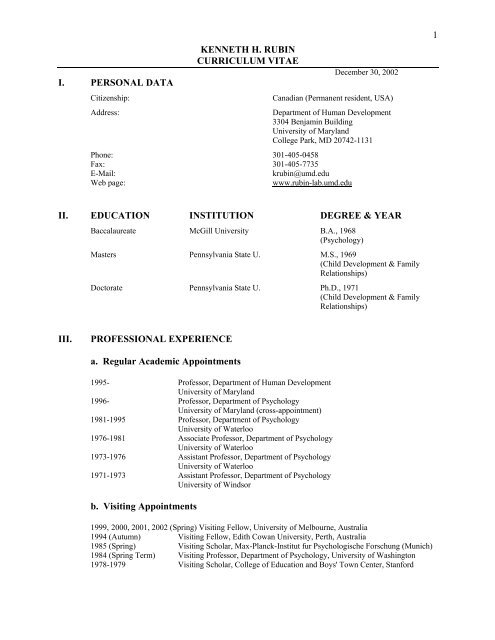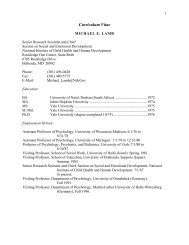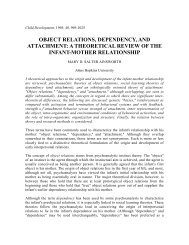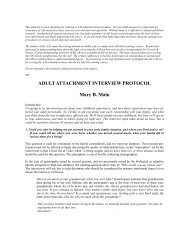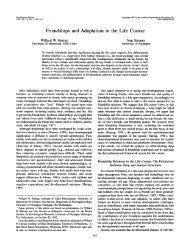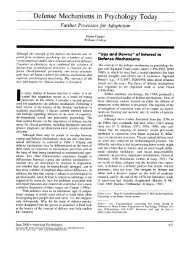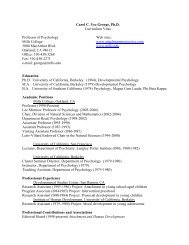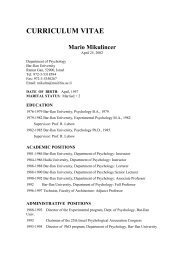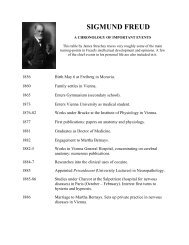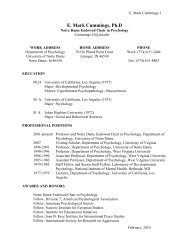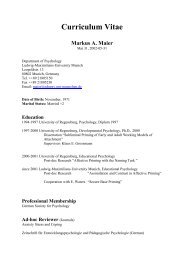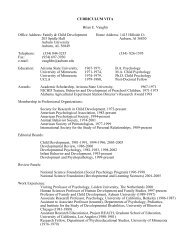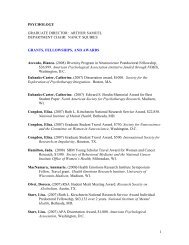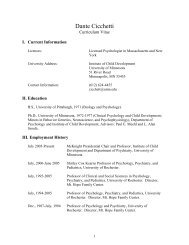kenneth h. rubin curriculum vitae - Psychology Department @ SUNY ...
kenneth h. rubin curriculum vitae - Psychology Department @ SUNY ...
kenneth h. rubin curriculum vitae - Psychology Department @ SUNY ...
You also want an ePaper? Increase the reach of your titles
YUMPU automatically turns print PDFs into web optimized ePapers that Google loves.
I. PERSONAL DATA<br />
KENNETH H. RUBIN<br />
CURRICULUM VITAE<br />
December 30, 2002<br />
Citizenship: Canadian (Permanent resident, USA)<br />
Address: <strong>Department</strong> of Human Development<br />
3304 Benjamin Building<br />
University of Maryland<br />
College Park, MD 20742-1131<br />
Phone: 301-405-0458<br />
Fax: 301-405-7735<br />
E-Mail:<br />
Web page:<br />
k<strong>rubin</strong>@umd.edu<br />
www.<strong>rubin</strong>-lab.umd.edu<br />
II. EDUCATION INSTITUTION DEGREE & YEAR<br />
Baccalaureate McGill University B.A., 1968<br />
(<strong>Psychology</strong>)<br />
Masters Pennsylvania State U. M.S., 1969<br />
(Child Development & Family<br />
Relationships)<br />
Doctorate Pennsylvania State U. Ph.D., 1971<br />
(Child Development & Family<br />
Relationships)<br />
III. PROFESSIONAL EXPERIENCE<br />
a. Regular Academic Appointments<br />
1995- Professor, <strong>Department</strong> of Human Development<br />
University of Maryland<br />
1996- Professor, <strong>Department</strong> of <strong>Psychology</strong><br />
University of Maryland (cross-appointment)<br />
1981-1995 Professor, <strong>Department</strong> of <strong>Psychology</strong><br />
University of Waterloo<br />
1976-1981 Associate Professor, <strong>Department</strong> of <strong>Psychology</strong><br />
University of Waterloo<br />
1973-1976 Assistant Professor, <strong>Department</strong> of <strong>Psychology</strong><br />
University of Waterloo<br />
1971-1973 Assistant Professor, <strong>Department</strong> of <strong>Psychology</strong><br />
University of Windsor<br />
b. Visiting Appointments<br />
1999, 2000, 2001, 2002 (Spring) Visiting Fellow, University of Melbourne, Australia<br />
1994 (Autumn) Visiting Fellow, Edith Cowan University, Perth, Australia<br />
1985 (Spring) Visiting Scholar, Max-Planck-Institut fur Psychologische Forschung (Munich)<br />
1984 (Spring Term) Visiting Professor, <strong>Department</strong> of <strong>Psychology</strong>, University of Washington<br />
1978-1979 Visiting Scholar, College of Education and Boys' Town Center, Stanford<br />
1
c. Consultation Positions Held<br />
1997-1998 Montgomery County Public Schools, Guidance Unit, Middle School<br />
Counselors<br />
1995-1996 Associated Member, Faculty of Graduate Studies, University of Guelph<br />
1994-1996 Advisory Committee, 'Today's Parent' Group<br />
1993-1994 Advisory Committee, World Book Publishing - Infancy Project<br />
1985-1989 Earlscourt Child and Family Center (Toronto)<br />
1984 Government of Ontario, Ministry of Natural Resources<br />
1971-1972 Windsor (Ontario) County Board of Education<br />
IV. UNIVERSITY ADMINISTRATION<br />
Director and Founder, Center for Children, Relationships, and Culture, University of Maryland, 1995-<br />
present.<br />
Faculty Chair, <strong>Department</strong> of Human Development, University of Maryland, 2000-2001<br />
Chair, Transition Committee, <strong>Department</strong> of Human Development, University of Maryland, 2000-2001<br />
Member, Search Committee, <strong>Department</strong> of Human Development, University of Maryland, 1998- 2001.<br />
Member, Graduate Committee, <strong>Department</strong> of Human Development, University of Maryland, 1995-2002.<br />
Member, Coordinating Committee, <strong>Department</strong> of Human Development, University of Maryland, 1995-<br />
1997; 2000-2001.<br />
Member, Tenure and Promotion Committee, College of Education, University of Maryland, 1997 - 1999.<br />
Member, Dean, College of Education Search Committee, <strong>Department</strong> of Human Development, University of<br />
Maryland, 1998- 1999.<br />
Member, Dean of Education Evaluation Committee, University of Maryland, 1997-1998.<br />
Chair, Graduate Committee, <strong>Department</strong> of Human Development, University of Maryland, 1995-1997.<br />
Chairman, Graduate Program in Developmental <strong>Psychology</strong>, University of Waterloo, 1976-1978; 1982-1984;<br />
1989-91.<br />
Director and Founder, University of Waterloo Early Childhood Education Center (1973-1978)<br />
V. PROFESSIONAL EXPERIENCE<br />
Organizational Governance<br />
Past President, International Society for the Study of Behavioral Development (2002-2004).<br />
President, International Society for the Study of Behavioral Development (1998-2002).<br />
General Secretary-Treasurer, International Society for the Study of Behavioral Development<br />
(1989-1992).<br />
Membership Secretary-Treasurer, International Society for the Study of Behavioral Development (1992-<br />
1994).<br />
Member, Steering Committee, International Society for the Study of Behavioral Development (1989-1994;<br />
1998-2004).<br />
Member, Executive Committee, International Society for the Study of Behavioral Development (1987-<br />
1994).<br />
Member-at-large, Division 7 Executive Board, American Psychological Association (1987-1990).<br />
Coordinator (President), Developmental Division, Canadian Psychological Association (1983-1984).<br />
2
Editorial Activities<br />
Board of Editors (Associate Editor), Child Development, July 1998-December 2001.<br />
Associate Editor, Child Development, January 1981-December 1983.<br />
Board of Editors, Parenting: Science and Practice, July 2001- present.<br />
Editorial Board, Social Development, 1991 - present.<br />
Editorial Board, International Journal of Behavioral Development, 1998 - present.<br />
Editorial Board, Child Development, 1977-1980; 1986-1996.<br />
Editorial Board, Developmental <strong>Psychology</strong>, 1986-1989.<br />
Editorial Board, Early Childhood Research Quarterly, 1985-1989.<br />
Guest Editor, Special section on “Recent perspectives on sociometric status in childhood”. Child<br />
Development, 1983, (vol. 54).<br />
Guest Editor, Special issue on ‘Peer relationships and social skills in childhood -- An international<br />
perspective’, Human Development, 1990 (vol. 33).<br />
Guest Editor, Special issue on ‘From Family to Peer Group: Relations Between Relationships Systems’,<br />
Social Development, 1994 (vol. 3, no. 3).<br />
Guest Editor, Special issue on ‘Social and Emotional Development: A Cross Cultural Perspective,<br />
Developmental <strong>Psychology</strong>, 1998.<br />
Research Activities<br />
Member, MacArthur Research Group on Temperament (Jerome Kagan, Chair, Harvard U.), 1988-1993.<br />
Director, International Consortium for the Study of Social and Emotional Development (research sites include<br />
Australia, Brazil, Canada, China, India, Italy, Korea, USA)<br />
VI. PROFESSIONAL MEMBERSHIPS<br />
American Psychological Association<br />
Society for Research in Child Development<br />
International Society for the Study of Behavioral Development<br />
Society for Research in Child and Adolescent Psychopathology<br />
VII. HONORS & DISTINCTIONS<br />
President, International Society for the Study of Behavioral Development (1998-2002).<br />
Ontario Mental Health Foundation -- Senior Research Fellowship, 1994-1995.<br />
Ontario Psychological Foundation -- Distinguished contribution to knowledge award - 1993<br />
Killam Research Fellowship (Canada Council), 1987-1989.<br />
Alumni Recognition Award, College of Health and Human Development, Pennsylvania State University,<br />
1987.<br />
Fellow, Canadian Psychological Association<br />
Fellow, American Psychological Association (Division 7)<br />
Social Sciences and Humanities Research Council of Canada, Leave Fellowship, 1986-1987.<br />
Canada Council Leave Fellowship, 1978-1979.<br />
Canada Council Doctoral Fellowship, 1970-1971.<br />
Pennsylvania State University Graduate School Fellowship, 1970-1971.<br />
3
VIII. RESEARCH AND PUBLICATIONS<br />
A. Books<br />
Rubin, K.H. & Priddle, R.E. (1977) The relationship between motor and cognitive development in elementary<br />
school-aged children. Queen's Park, Toronto: Ontario Ministry of Education.<br />
Rubin, K.H. (Ed.), (1980). Children's play (New Directions for Child Development). San Francisco: Jossey-Bass.<br />
Rubin, K.H. & Ross, H.S. (Eds.) (1982). Peer relationships and social skills in childhood. New York: Springer-<br />
Verlag.<br />
Pepler, D.J. & Rubin, K.H. (Eds.) (1982). The play of children: Current theory and research. Basel, Switzerland:<br />
Karger AG.<br />
Schneider, B., Rubin, K.H. & Ledingham, J. (Eds.) (1985). Children's peer relations: Issues in assessment and<br />
intervention. New York: Springer-Verlag.<br />
* Joan Kershaw Publication Award (Book of the year), Canadian Council for Exceptional Children, 1987.<br />
Pepler, D.J. & Rubin, K.H. (Eds.) (1991). The development and treatment of childhood aggression. Hillsdale,<br />
N.J.: Erlbaum.<br />
Rubin, K.H. & Asendorpf, J. (Eds.) (1993). Social withdrawal, shyness, and inhibition in childhood. Hillsdale,<br />
N.J.: Erlbaum.<br />
Rubin, K.H. (2002). The friendship factor. New York: Viking/Penguin.<br />
*Gold Award, 2002 National Parenting Publications Awards<br />
Rubin, K.H.& Killen, M. (Eds) (in preparation). Social development in childhood. London, UK: <strong>Psychology</strong><br />
Press.<br />
B. Journal Publications<br />
Peters, D.L. & Rubin, K.H. (1969). The effects of cued materials and transformation variations on conservation of<br />
number performance. Alberta Journal of Educational Research, 15, 47-56.<br />
Rubin, K.H., Hultsch, D.F. & Peters, D.L. (1971). Non-social speech in four-year-old children as a function of birth<br />
order and interpersonal situation. Merrill-Palmer Quarterly of Behavior and Development, 17, 41-50.<br />
Rubin, K.H. & Tierney, M.C. (1972). When students choose their own examination dates: Lock-step education<br />
revisited. The School Guidance Worker, 47-50.<br />
Rubin, K.H. (1972). Relationship between egocentric communication and popularity among peers. Developmental<br />
<strong>Psychology</strong>, 7, 364.<br />
Rubin, K.H. (1973). Egocentrism in childhood: A unitary construct? Child Development, 44, 102-110.<br />
Rubin, K.H. & Tierney, M.C. (1973). Students' self selection of examination dates: A preliminary investigation.<br />
Alberta Journal of Educational Research,19, 85-89.<br />
Rubin, K.H. (1973). Decentration skills in institutionalized and non-institutionalized elderly. Proceedings of the<br />
81st Annual Convention of the American Psychological Association, 763-764.<br />
Rubin, K.H. & Schneider, F.W. (1973). The relationship between moral judgment, egocentrism, and altruistic<br />
behavior. Child Development, 44, 661-665. Reprinted in R.C. Smart & M. Smart (Eds.), Readings in Child<br />
Development and Relationships. New York: MacMillan, 1977.<br />
Rubin, K.H., Attewell, P.W., Tierney, M.C., & Tumolo, P. (1973). The development of spatial egocentrism and<br />
conservation across the life-span. Developmental <strong>Psychology</strong>, 8, 432.<br />
Rubin, K.H. (1974). Piaget in the preschool: A Canadian perspective. Orbit,5, 4-8.<br />
4
5<br />
Rubin, K.H. & Orr, R.R. (1974). Spatial egocentrism in retarded and non-retarded children. American Journal of<br />
Mental Deficiency, 79, 95-98.<br />
Rubin, K.H. & Wilmshurst, L.A. (1974). Training preschoolers to understand left-right relations: Lesson plans.<br />
Research in Education, 9, 105.<br />
Rubin, K.H. (1974). The relationships between spatial and communicative egocentrism in children and young and<br />
old adults. Journal of Genetic <strong>Psychology</strong>, 125, 295-301.<br />
Wilmshurst, L.A. & Rubin, K.H. (1975). Training preschoolers to understand left-right relations. Research in<br />
Education (January).<br />
Tierney, M.C. & Rubin, K.H. (1975). Egocentrism and conformity in early childhood. Journal of Genetic<br />
<strong>Psychology</strong>, 126, 209-215.<br />
Rubin, K.H. & Maioni, T. (1975). Play preference and its relationship to ego-centrism, popularity, and<br />
classification skills in preschoolers. Merrill-Palmer Quarterly of Behavior and Development, 21, 171-179.<br />
Rubin, K.H. & Brown, I.D.R. (1975). A life-span look at person perception and its relationship to communicative<br />
interaction. Journal of Gerontology, 30, 461-468. Reprinted in I.M. Hulicka (Ed.), Empirical studies in the<br />
psychology of aging. William Hackett Publishing, 1977.<br />
Rubin, K.H. (1976). Extinction of conservation: A life-span investigation. Developmental <strong>Psychology</strong>, 12, 51-56.<br />
Rubin, K.H. (1976).A comparison of preschool curricula for disadvantaged children: A Canadian study. Canadian<br />
Journal of Behavioural Sciences, 8, 145-155.<br />
Rubin, K.H., Maioni, T.L., & Hornung, M. (1976). Free play behaviors in middle and lower class preschoolers:<br />
Parten and Piaget revisited. Child Development, 47, 414-419.<br />
Rubin, K.H. (1976). Social interaction and communicative egocentrism in preschoolers. Journal of Genetic<br />
<strong>Psychology</strong>, 129, 121-124.<br />
Rubin, K.H. (1976) The relationship of social participation to role-taking skills in preschool children. Psychological<br />
Reports, 39, 823-826.<br />
Rubin, K.H. & Hansen, R. (1976). Teaching attitudes and behaviours of preschool personnel: Curriculum<br />
variations. Alberta Journal of Educational Research, 22, 261-269.<br />
Priddle, R. & Rubin, K.H. (1977). A comparison of two methods for the training of spatial cognition in<br />
preschoolers. Merrill-Palmer Quarterly of Behavior and Development, 23, 57-65.<br />
Rubin, K.H. (1977). The play behaviors of young children. Young Children, 32, 16-24.<br />
Rubin, K.H. & Trotter, K.T. (1977). Kohlberg's moral judgment scale: Some methodological considerations.<br />
Developmental <strong>Psychology</strong>, 13, 535-536.<br />
Rubin, K.H. (1977). The social and cognitive value of preschool toys and activities.Canadian Journal of<br />
Behavioural Sciences, 9, 382-385.<br />
Rubin, K.H. , Brown, I.D.R., & Priddle, R. (1978). The relationship between measures of fluid, crystallized, and<br />
Piagetian intelligence in elementary school-aged children. Journal of Genetic <strong>Psychology</strong>, 132, 29-36.<br />
Rubin, K.H. (1978). Role-taking in childhood: Some methodological considerations. Child Development, 49, 428-<br />
433.<br />
Rubin, K.H.,Watson, K. & Jambor, T. (1978). Free play behaviors in preschool and kindergarten children. Child<br />
Development, 49, 534-536.<br />
Evans, M.A. & Rubin, K.H. (1979). Hand gestures as a communicative mode in school-aged children. Journal of<br />
Genetic <strong>Psychology</strong>, 135, 189-196.<br />
Rubin, K.H. & Dyck, L. (1980). Preschoolers' private speech in a play settiing. Merrill-Palmer Quarterly of<br />
Behavior and Development, 26, 219-229.<br />
Rubin, K.H. & Krasnor, L.R. (1980). Changes in the play behaviors of preschoolers: A short-term longitudinal<br />
investigation. Canadian Journal of Behavioural Science, 12, 278-282.
6<br />
Rubin, K.H. & Hayvren, M. (1981). The social and cognitive play of children differing with regard to sociometric<br />
status. Journal of Research and Development in Education, 14, 116-122.<br />
Rubin, K.H. & Seibel, C. (1981). The effects of ecological setting on the cognitive and social play behaviors of<br />
preschoolers. In Proceedings of the Ninth Annual International Interdisciplinary UAP-USC Conference on<br />
Piagetian Theory and the Helping Professions .<br />
Rubin, K.H. & Pepler, D.J. (1982). A neo-Piagetian perspective of children's play. Contemporary Educational<br />
<strong>Psychology</strong>, 7, 289-300.<br />
Rubin, K.H., Daniels-Beirness, T. & Hayvren, M. (1982). Correlates of peer acceptance and rejection in early<br />
childhood. Canadian Journal of Behavioural Sciences, 14, 338-348.<br />
Pepler, D.J. & Rubin, K.H. (1982). Current issues in the study of children's play. Human Development, 25, 443-<br />
447.<br />
Rubin, K.H. (1982). Non-social play in preschoolers: Necessarily evil? Child Development, 53, 651-657.<br />
Cheyne, J.A. & Rubin, K.H. (1983). Playful precursors of problem-solving skills. Developmental <strong>Psychology</strong>, 19,<br />
577-584.<br />
Reprinted in F.B. Hughes, L.D. Hoppe, & I.C. Noppe (1988). Child Development, St. Paul, MN: West<br />
Publishing.<br />
Rubin, K.H. & Clark, M.L. (1983). Preschool teachers' ratings of behavioral problems: Observational, sociometric,<br />
and social-cognitive correlates. Journal of Abnormal Child <strong>Psychology</strong>, 11, 273-286.<br />
Rubin, K.H. & Daniels-Beirness, T. (1983). Concurrent and predictive correlates of sociometric status in<br />
kindergarten and grade one children. Merrill-Palmer Quarterly of Behavior and Development, 29, 337-<br />
351.<br />
Evans, M.A. & Rubin, K.H. (1983). Developmental differences in explanations of children's games. Child<br />
Development, 54, 1559-1567.<br />
Krasnor, L.R. & Rubin, K.H. (1983). Preschool social problem-solving: Attempts and outcomes in naturalistic<br />
interaction. Child Development, 54, 1545-1558.<br />
Rubin, K.H. & Krasnor, L.R. (1983). Age and gender differences in the development of a representative social<br />
problem solving skill. Journal of Applied Developmental <strong>Psychology</strong>, 4, 463-475.<br />
Rubin, K.H. (1983). Recent perspectives on sociometric status in childhood: Some introductory remarks. Child<br />
Development, 54, 1383-1385.<br />
Rubin, K.H. , Daniels-Beirness, T. & Bream, L. (1984). Social isolation and social problem solving: A longitudinal<br />
study. Journal of Consulting and Clinical <strong>Psychology</strong>, 52, 17-25.<br />
Rubin, K.H. & Howe, J.N. (1985). Influence of toys and play materials on children's play. Topics in Early<br />
Childhood Special Education, 5, 1-9.<br />
LeMare, L.J. & Rubin, K.H. (1987). Perspective-taking and peer interaction: Structural and developmental<br />
analyses. Child Development, 58, 306-315.<br />
Rubin, K.H., Moller, L. & Emptage, A. (1987). The Preschool Behavior Questionnaire: A useful index of behavior<br />
problems in elementary school-age children? Canadian Journal of Behavioural Sciences, 19, 86-100.<br />
Rubin, K.H. (1987). Facts and fictions concerning children's play. (review of L. Galda & A. Pellegrini, Play,<br />
language, and stories). Contemporary <strong>Psychology</strong>, 32, 127-129.<br />
Rubin, K.H. & Ross, H.S. (1987). On relating relationships and development. (review of W.W. Hartup & Z.<br />
Rubin, Relationships and development ). Contemporary <strong>Psychology</strong>, 32, 330-332.<br />
Hayden-Thomson, L., Rubin, K.H. & Hymel, S. (1987). Sex differences in sociometric choices. Developmental<br />
<strong>Psychology</strong>, 23, 558-562.<br />
Rubin, K.H. (1987). Review of P.S. Strain, M.J. Guralnick, & H.M. Walker (Eds.), Children's social behavior. In<br />
Child Development Abstracts and Bibliography, 61, 328-329.<br />
Moller, L. & Rubin, K.H. (1988). A psychometric assessment of a two factor solution for the Preschool Behavior<br />
Questionnaire in mid-childhood. Journal of Applied Developmental <strong>Psychology</strong>, 9, 167-180.
7<br />
Rubin, K.H. & Mills, R.S.L. (1988). The many faces of social isolation in childhood. Journal of Consulting and<br />
Clinical <strong>Psychology</strong>, 56, 916-924.<br />
Rubin, K.H. & Ross, H.S. (1988). Toward the study of social competence, social status and social relationships: A<br />
commentary. Monographs of The Society for Research in Child Development, 53, 79-87.<br />
Rubin, K.H., Hymel, S. & Mills, R.S.L. (1989). Sociability and social withdrawal in childhood: Stability and<br />
outcomes. Journal of Personality, 57, 237-255.<br />
Rubin, K.H., Hymel, S., LeMare, L. & Rowden, L. (1989). Children experiencing social difficulties: Sociometric<br />
neglect reconsidered. Canadian Journal of Behavioural Science, 21, 94-111.<br />
Rubin, K.H. (1989). Where the boys are (review of G. Fine, With The Boys), Contemporary <strong>Psychology</strong>, 34, 160-<br />
161.<br />
Rubin, K.H. & Both, L. (1989). Iris pigmentation and sociability in childhood: A re-examination. Developmental<br />
Psychobiology, 22, 717-726.<br />
Mills, R.S.L. & Rubin, K.H. (1990). Parental beliefs about problematic social behaviors in early childhood. Child<br />
Development, 61, 138-151.<br />
Rubin, K.H., Both, L. & Wilkinson, M. (1990). The Waterloo Longitudinal Project: Correlates and consequences<br />
of social withdrawal in childhood. Infancia y Aprendizaje (Spain), 49, 73-90.<br />
Rubin, K.H. (1990). Peer relationships and social skills in childhood: An international perspective. Human<br />
Development. 33, 221-224.<br />
Rubin, K.H. & Mills, R.S.L. (1990). Maternal beliefs about adaptive and maladaptive social behaviors in normal,<br />
aggressive and withdrawn preschoolers. Journal of Abnormal Child <strong>Psychology</strong>, 18, 419-436.<br />
Hymel, S., Rubin, K.H., Rowden, L. & LeMare, L. (1990). Children's peer relationships: Longitudinal prediction<br />
of internalizing and externalizing problems from middle to late childhood. Child Development, 61, 2004-<br />
2021.<br />
Booth, C., Rose-Krasnor, L. & Rubin, K.H. (1991). Relating preschoolers' social competence and their mothers'<br />
parenting behaviors to early attachment security and high risk status. Journal of Social and Personal<br />
Relationships, 8, 363-382.<br />
Rubin, K.H. & Mills, R.S.L. (1991). Conceptualizing developmental pathways to internalizing disorders in<br />
childhood. Canadian Journal of Behavioural Science, 23, 300-317.<br />
Rubin, K.H., Both, L., Zahn-Waxler, C., Cummings, E.M., & Wilkinson, M. (1991). The dyadic play behaviors of<br />
preschoolers with depressed versus well mothers. Development and Psychopathology, 3, 243-251.<br />
Mills, R.S.L. & Rubin, K.H. (1992). Continuity and change in maternal beliefs about adaptive and maladaptive<br />
social behaviors. Merrill-Palmer Quarterly, 48, 494-512.<br />
Moller, L., Hymel, S. & Rubin, K.H. (1992). Sex typing in play and popularity in middle childhood. Sex Roles,<br />
26, 331-353.<br />
Chen, X. & Rubin, K.H. (1992). Correlates of peer acceptance in a Chinese sample of six year olds. International<br />
Journal of Behavioral Development, 15, 259-274.<br />
Chen, X., Rubin, K.H., Li, D., Li, Z., & Li, B. (1992). Social behaviors and peer acceptance in Chinese and<br />
western children. Psychological Science (China), 2, 1-8.<br />
Chen, X., Rubin, K.H., Sun, Y. (1992). Social reputation and peer relationships in Chinese and Canadian children:<br />
A cross-cultural study. Child Development, 63, 1336-1343.<br />
Rubin, K.H., Chen, X. & Hymel, S. (1993). Socio-emotional characteristics of aggressive and withdrawn children.<br />
Merrill-Palmer Quarterly, 49, 518-534.<br />
Chen, X., Rubin, K.H., & Li, B. (1994). Only children and sibling children in China: A re-examination.<br />
International Journal of Behavioral Development., 17, 413-421.<br />
Coplan, R.J., Rubin, K.H., Fox, N.A., Calkins, S.D., & Stewart, S.L. (1994). Being alone, playing alone, and<br />
acting alone: Distinguishing among reticence, and passive-, and active-solitude in young children. Child<br />
Development, 65, 129-138 .
8<br />
Rubin, K.H., Lynch, D., Coplan, R.J., Rose-Krasnor, L., & Booth, C.L. (1994). "Birds of a feather ...": Behavioral<br />
concordances and preferential personal attraction in children. Child Development., 65, 1778-1785.<br />
Booth, C.L., Rose-Krasnor, L., McKinnon, J., & Rubin, K.H. (1994). Predicting social adjustment in middle<br />
childhood: The role of preschool attachment security and maternal style. Social Development., 3, 189-204.<br />
Chen, X. & Rubin, K.H. (1994). Family conditions, parental acceptance, and social competence and aggression in<br />
Chinese children. Social Development., 3, 269-290.<br />
Rubin, K.H. (1994). From family to peer group: Relations between relationships systems -- An editorial. Social<br />
Development., 3, v-x.<br />
Rubin, K.H., Coplan, R.J., Fox, N.A., & Calkins, S.D. (1995). Emotionality, emotion regulation, and preschoolers'<br />
social adaptation. Development and Psychopathology, 7, 49-62.<br />
Stewart, S.L. & Rubin, K.H. (1995). The social problem solving skills of anxious-withdrawn children.<br />
Development and Psychopathology, 7, 323-336.<br />
Chen, X., Rubin, K.H., & Li, Z. (1995). Social functioning and adjustment in Chinese children: A longitudinal<br />
study. Developmental <strong>Psychology</strong>, 31, 531-539.<br />
Chen, X., Rubin, K.H., & Li, B. (1995). Social and school adjustment of shy and aggressive children in China.<br />
Development and Psychopathology, 7, 337-349.<br />
Rubin, K.H., Chen, X., McDougall, P., Bowker, A., & McKinnon, J. (1995). The Waterloo Longitudinal Project:<br />
Predicting adolescent internalizing and externalizing problems from early and mid-childhood.<br />
Development and Psychopathology, 7, 751-764.<br />
Fox, N.A., Rubin, K.H., Calkins, S.D., Marshall, T.R., Coplan, R.J., Porges, S.W., Long, J. & Stewart, S.L. (1995).<br />
Frontal activation asymmetry and social competence at four years of age: Left frontal hyper- and hypoactivation<br />
as correlates of social behavior in preschool children. Child Development., 66, 1770-1784.<br />
Chen, X., Rubin, K.H., & Li, B. (1995). Depressed mood in Chinese children: Relations with school performance<br />
and family environment. Journal of Consulting and Clinical <strong>Psychology</strong>, 63, 938-947.<br />
Rose-Krasnor, L., Rubin, K.H., Booth, C.L., & Coplan, R.J. (1996). Maternal directiveness and child attachment<br />
security as predictors of social competence in preschoolers. International Journal of Behavioral<br />
Development, 19, 309-325.<br />
Fox, N.A., Calkins, S.D., Schmidt, L. Rubin, K.H., & Coplan, R.J. (1996). The role of frontal activation in the<br />
regulation and dysregulation of social behavior during the preschool years. Development and<br />
Psychopathology, 8, 89-102.<br />
Udvari, S. J. & Rubin, K. H. (1996). Gifted and nongifted children’s perceptions of academic achievement,<br />
academic effort, and athleticism. Gifted Child Quarterly, 6, 211-219.<br />
Chen, X., Rubin, K.H., & Li, D. (1997). Relation between academic achievement and social adjustment: Evidence<br />
from Chinese children. Developmental <strong>Psychology</strong>, 33, 518-525.<br />
Rubin, K.H., Hastings, P.D., Stewart, S., Henderson, H.A. & Chen, X.. (1997). The consistency and concomitants<br />
of inhibition: Some of the children, all of the time. Child Development, 68, 467-483.<br />
Schmidt, L. A., Fox, N.A., Rubin, K.H., Sternberg, E.M., Gold, P.W., Smith, C.C., & Schulkin, J. (1997).<br />
Behavioral and neuroendocrine responses in shy children. Developmental Psychobiology, 30, 127-140.<br />
Chen, X., Rubin, K.H., & Li, D. (1997). Maternal acceptance and social and school adjustment in Chinese<br />
children: A longitudinal study. Merrill-Palmer Quarterly, 53, 663-681.<br />
Coplan, R.J. & Rubin, K.H. (1998) Exploring and assessing non-social play in the preschool: The Development<br />
and validation of the Preschool Play Behavior Scale. Social Development, 7, 72-91.<br />
Coplan, R.J., Coleman, B., & Rubin, K.H. (1998). Shyness and Little Boy Blue: Iris pigmentation, gender, and<br />
social wariness in preschoolers. Developmental Psychobiology, 32, 37-44.<br />
Booth, C. L., Rubin, K.H., & Rose-Krasnor, L. (1998). Perceptions of emotional support from mother and friend<br />
in middle childhood: Links with social-emotional adaptation and preschool attachment security. Child<br />
Development, 69, 427-442.
9<br />
Rubin, K.H. (1998) Social and emotional development from a cross-cultural perspective. Developmental<br />
<strong>Psychology</strong>, 34, 611-615.<br />
Chen, X., Hastings, P.D., Rubin, K.H., Chen, H., Cen, G., & Stewart, S.L. (1998). Child-rearing practices and<br />
behavioral inhibition in Chinese and Canadian toddlers: A cross-cultural study. Developmental<br />
<strong>Psychology</strong>, 34, 677-686.<br />
Mills, R.S.L. & Rubin, K.H. (1998). Are behavioral control and psychological control both differentially<br />
associated with childhood aggression and social withdrawal? Canadian Journal of Behavioral Sciences,<br />
30, 132-136.<br />
Rubin, K.H., Hastings, P.D., Chen, X., & McNichol, K. (1998). Intrapersonal and familial correlates of aggression,<br />
conflict, and externalizing problems in toddlers. Child Development , 69, 1614-1629.<br />
Chen, X., Rubin, K.H., & Li, D., & Li, Z. (1999). Adolescent outcomes of social functioning in Chinese Children.<br />
International Journal of Behavioral Development, 23, 199-223.<br />
Hastings, P.D. & Rubin, K.H. (1999). A longitudinal study of the development of mothers’ beliefs about<br />
preschool-aged children’s social behavior. Child Development , 70, 722-741.<br />
Rubin, K.H., Nelson, L.J., Hastings, P.D., & Asendorpf, J. (1999). The transaction between parents' perceptions of<br />
their children's shyness and their parenting styles. International Journal of Behavioral Development, 23,<br />
937-958.<br />
Jones Harden, B., Winslow, M.B., Kendziora, K. T., Shanhinfar, A., Rubin, K.H., Fox, N.A., Crowley, M.J., &<br />
Zahn-Waxler, C. (2000). Externalizing difficulties in Head Start children: An ecological exploration.<br />
Early Education and Development, 11, 357-385.<br />
Henderson, H.A., Fox, N.A., & Rubin, K.H. (2001). Temperamental contributions to social behavior: The<br />
moderating roles of frontal EEG asymmetry and gender. Journal of the American Academy of Child and<br />
Adolescent Psychiatry, 40, 68-74.<br />
Rubin, K.H., Cheah, C.S.L., & Fox, N.A. (2001). Emotion regulation, parenting, and the display of social reticence<br />
in preschoolers. Early Education and Development, 12, 97-115.<br />
Fox, N.A., Henderson, H.A., Rubin, K.H., Calkins, S.D., & Schmidt, L.A. (2001). Stability and instability of<br />
behavioral inhibition and exuberance: Psychophysiological and behavioral factors influencing change and<br />
continuity across the first four years of life. Child Development, 72, 1-21.<br />
Chen, X., Liu, M., Rubin, K.H., & Cen, G., & Li, D. (2002). Sociability and prosocial orientation as predictors of<br />
youth adjustment: A seven-year longitudinal study in a Chinese sample. International Journal of<br />
Behavioral Development.<br />
Rubin, K.H., Burgess, K.B., & Hastings, P.D. (2002). Stability and social-behavioral consequences of toddlers’<br />
inhibited temperament and parenting. Child Development, 73, 483-495.<br />
Schmidt, L.A., Fox., N.A., Rubin, K.H., Hu, S., Hamer, D.H. (2002). Molecular genetics of shyness and<br />
aggression in preschoolers. Personality and Individual Differences, 33, 227-238.<br />
Burgess, K.B., Marshall, P., Rubin, K.H., & Fox, N.A. (2003) Infant attachment and temperament as predictors of<br />
subsequent behavior problems and psychophysiological functioning. Journal of Child <strong>Psychology</strong> and<br />
Psychiatry and Allied Disciplines, 44, 1-13.<br />
Chen, X., Liu, M., Rubin, K.H., Li, D., Li, Z., Cen, G., & Li, B. (in press). Parental reports of externalizing and<br />
internalizing behaviors in Chinese children: Relevancy to social, emotional, and school adjustment.<br />
Journal of <strong>Psychology</strong> in Chinese Societies.<br />
Rubin, K.H., Burgess, K.B., Dwyer, K.M., & Hastings, P.D. (in press) Predicting preschoolers’ externalizing<br />
behaviors from toddler temperament, conflict, and maternal negativity. Developmental <strong>Psychology</strong>.<br />
Chen, X., Liu, M., Rubin, K.H., Hen, H., Wang, L., & Li, D. (in press). Compliance in Chinese and Canadian<br />
toddlers: A cross-cultural study. International Journal of Behavioral Development.<br />
Cheah, C.S.L & Rubin, K.H. (in press) European-American and Mainland Chinese mothers socialization beliefs<br />
regarding preschoolers’ social skills. Parenting: Science and Practice.
C. Chapters<br />
Rubin, K.H. (1975). Day care and early education in Ontario: A Canadian perspective. In D.L. Peters (Ed.), Day<br />
care - Problems, process, and prospects. New York: Behavioral Publications.<br />
Rubin, K.H. (1979). The impact of the natural setting on speech for self. In G. Zivin (Ed.), Development of self<br />
regulation through speech. New York: Wiley.<br />
Rubin, K.H. & Pepler, D.J. (1980). The relationship of child's play to social-cognitive development. In H. Foot, T.<br />
Chapman, & J. Smith (Eds.), Friendship and childhood relationships. London: Wiley.<br />
Rubin, K.H. (1980). Fantasy play: Its role in the development of social skills and social cognition. In K.H. Rubin<br />
(Ed.), Children's play. San Francisco: Jossey-Bass.<br />
Krasnor, L.R. & Rubin, K.H. (1981). The assessment of social problem solving skills in young children. In T.<br />
Merluzzi, C. Glass, & M. Genest (Eds.), Cognitive assessment. (pp. 452-476). New York: Guilford Press.<br />
Rubin, K.H. & Abrahams Everett, B. (1982) Social perspective taking in young children. In S. Moore & C. Cooper<br />
(Eds.), The young child. (Vol 3), Washington, D.C.: N.A.E.Y.C. Publications.<br />
Rubin, K.H. (1982). Early play theories revisited: Contributions to contemporary research and theory. In D.J.<br />
Pepler & K.H. Rubin (Eds.) The play of children: Current theory and research. Basel, Switzerland: S.<br />
Karger AG.<br />
Rubin, K.H. & Ross, H.S. (1982). Some reflections on the state of the art: The study of peer relationships and<br />
social skills. In K.H. Rubin & H.S. Ross (Eds.), Peer relationships and social skills in childhood. New<br />
York: Springer-Verlag.<br />
Rubin, K.H. (1982). Social and social-cognitive developmental characteristics of young isolate, normal and<br />
sociable children. In K.H. Rubin & H.S. Ross (Eds.), Peer relationships and social skills in childhood.<br />
New York: Springer-Verlag. (pp. 353-374)<br />
Levin, E. & Rubin, K.H. (1983) Getting others to do what you want them to do: The development of children's<br />
requestive strategies. In K. Nelson (Ed.), Child language (Vol. 4) Hillsdale, N.J.: Erlbaum.<br />
Quinn, J. & Rubin, K.H. (1983) The play of handicapped children. In T. Yawkey & A. Pellegrini (Eds.), Child's<br />
play: Developmental and applied. Hillsdale, N.J.: Erlbaum. (pp.63-80)<br />
Rubin, K.H., Fein, G.G. & Vandenberg, B. (1983). Play. In E.M. Hetherington (Ed.), Handbook of child<br />
psychology, Vol. 4, Socialization, personality, and social development. (4th edition). New York: Wiley.<br />
Rubin, K.H. & Borwick, D. (1984). Communicative skills and sociability. In H.E. Sypher & J.L. Applegate (Eds.),<br />
Communication by children and adults: Social cognitive and strategic processes. Beverly Hills, Ca.: Sage<br />
Publications. (pp. 152-170)<br />
Norris, J. & Rubin, K.H. (1984) Social interaction and communication: A life-span perspective. In P.B. Baltes &<br />
O.G. Brim (Eds.), Life-span development and behavior, (Vol. 6). New York: Academic Press. (pp. 356-<br />
391).<br />
Rubin, K.H. (1985) Social play and social development. In C. Caldwell Brown & A. Gottfried (Eds.), Play and<br />
child development. New York: Johnson & Johnson Publications. (pp. 88-96)<br />
Hymel, S. & Rubin, K.H. (1985). Children with peer relationships and social skills problems: Conceptual,<br />
methodological, and developmental issues. In G. Whitehurst (Ed.), Annals of child development. (Vol.2)<br />
Greenwich, Conn.: JAI Press. (pp. 251-297).<br />
Rubin, K.H. (1985). Socially withdrawn children: An "at risk" population? In B. Schneider, K.H. Rubin, & J.<br />
Ledingham (Eds.), Children's peer relations: Issues in assessment and intervention. New York: Springer-<br />
Verlag. (pp. 125-139)<br />
Rubin, K.H. (1986) Play, peers, and social development. In A.W.Gottfried & C.Caldwell Brown (Eds.), Play<br />
interactions: The contribution of play materials and parental involvement to child development. Lexington,<br />
Mass.: Heath (pp. 163-174).<br />
10
11<br />
Rubin, K.H. & Krasnor, L.R. (1986). Social-cognitive and social behavioral perspectives on problem solving. In<br />
M. Perlmutter (Ed.),Cognitive perspectives on children's social and behavioral development. The<br />
Minnesota Symposia on Child <strong>Psychology</strong> (Vol. 18). Hillsdale, N.J.: Erlbaum. (pp.1-68).<br />
Rubin, K.H. & Cohen, J.S. (1986). Predicting peer ratings of aggression and withdrawal in the middle childhood<br />
years. In R.J. Prinz (Ed.), Advances in behavioral assessment of children and families. Greenwich, Conn.:<br />
JAI Press. (pp. 179-206).<br />
Rubin, K.H. & Howe, J.N. (1986). Play and social cognition. In G.G. Fein & M. Rivkin (Eds.), The young child at<br />
play. Washington, D.C.: N.A.E.Y.C. Publications. (pp. 113-126).<br />
Rubin, K.H. (1988). Dramatic play in childhood: Some good news, some bad news. In D. Bergen (Ed.), Play as a<br />
learning medium. Philadelphia Heineman.<br />
Rubin, K.H. & Lollis, S. (1988). Origins and consequences of social withdrawal. In J. Belsky & T. Nezworski<br />
(Eds.), Clinical implications of attachment. Hillsdale, N.J.: Erlbaum. (pp. 219-252).<br />
Rubin, K.H., Mills, R.S.L., & Krasnor, L. (1989). Maternal beliefs and children's social competence. In B.<br />
Schneider, G. Attilli, J. Nadel-Brulfert & R. Weissberg (Eds.), Social competence in developmental<br />
perspective, Kluwer International Publishers. (pp.313-331).<br />
Rubin, K.H., LeMare, L. & Lollis, S. (1990). Social withdrawal in childhood: Developmental pathways to peer<br />
rejection. In S. Asher & J. Coie (Eds.),Peer rejection in childhood. New York: Cambridge University<br />
Press (pp. 217-249).<br />
Pepler, D.J. & Rubin, K.H. (1991). The development and treatment of childhood aggression: Current challenges.<br />
In D.J. Pepler & K.H. Rubin (Eds.), The development and treatment of childhood aggression. Hillsdale,<br />
N.J.: Erlbaum.<br />
Rubin, K.H., Bream, L. & Rose-Krasnor, L. (1991). Social problem solving skills and deficits of aggressive<br />
children. In D.J. Pepler & K.H. Rubin (Eds.), The development and treatment of childhood aggression.<br />
(pp. 219-248) Hillsdale, N.J.: Erlbaum.<br />
Rubin, K.H., Hymel, S., Mills, R.S.L. & Rose-Krasnor, L. (1991). Conceptualizing different pathways to and from<br />
social isolation in childhood. In D. Cicchetti and S. Toth (Eds.), The Rochester Symposium on<br />
Developmental Psychopathology, Vol. 2, Internalizing and externalizing expressions of dysfunction, (pp.<br />
91-122). New York: Cambridge University Press.<br />
Rubin, K.H. & Rose-Krasnor, L. (1992). Interpersonal problem solving. In V.B. Van Hasselt & M. Hersen (Eds.),<br />
Handbook of Social Development (pp. 283-323). New York: Plenum.<br />
Rubin, K.H. (1992). Social relationships and social development. In P.G. Ramsey (Ed.), Encyclopedia of Early<br />
Childhood Education (pp. 231-233). New York: Garland Publishing.<br />
Rubin, K.H. & Mills, R.S.L. (1992). Parents' ideas about the development of aggression and withdrawal. In I.<br />
Sigel, J. Goodnow, & A. McGillicuddy-deLisi (Eds.), Parental Belief Systems (pp.41-68). Hillsdale, N.J.:<br />
Erlbaum.<br />
Rubin, K.H. & Coplan, R. (1992). Peer relationships in childhood. In M. Bornstein & M. Lamb (Eds.),<br />
Developmental <strong>Psychology</strong>: An advanced textbook (pp.519-578) 3rd Edition. Hillsdale, NJ: Erlbaum.<br />
Rubin, K.H. (1993). The Waterloo Longitudinal Project: Continuities of social withdrawal from early childhood<br />
to early adolescence. In K.H. Rubin & J. Asendorpf (Eds.), Social withdrawal, inhibition, and shyness in<br />
childhood. Hillsdale, N.J.: Erlbaum.<br />
Mills, R.S.L., & Rubin, K.H. (1993). Socialization factors in the development of social withdrawal. In K.H. Rubin<br />
& J. Asendorpf (Eds.), Social withdrawal, inhibition, and shyness in childhood. Hillsdale, N.J.: Erlbaum.<br />
Rubin, K.H. & Asendorpf, J. (1993). Social withdrawal, inhibition and shyness in childhood: Conceptual and<br />
definitional issues. In K.H. Rubin & J. Asendorpf (Eds.), Social withdrawal, inhibition, and shyness in<br />
childhood. Hillsdale, N.J.: Erlbaum.<br />
Mills, R.S.L., & Rubin, K.H. (1993). Parental beliefs about children's social development. In S. Duck (Ed.),<br />
Understanding Relationship Processes, Vol. 2, Learning about relationships (pp. 98-117). Newbury Park,<br />
CA: Sage Publications.
12<br />
Rubin, K.H., Booth, C., Rose-Krasnor, L., & Mills, R.S.L. (1995). Family relationships, peer relationships and<br />
social development: Conceptual and empirical analyses. In S. Shulman (Ed.), Close relationships and<br />
socio-emotional development. (pp. 63-94). Hillsdale, N.J.: Erlbaum.<br />
Rubin, K.H., Stewart, S.L., & Coplan, R.J. (1995). Social withdrawal in childhood: Conceptual and empirical<br />
perspectives. In T.H. Ollendick & R.J. Prinz (Eds.), Advances in clinical child psychology, Volume 17.<br />
(pp. 157-196). New York, N.Y.: Plenum Publishing.<br />
Rubin, K.H., Stewart, S.L., & Chen, X. (1995). Parents of aggressive and withdrawn children. In M. Bornstein<br />
(Ed.), Handbook of Parenting. (pp. 255-284). Hillsdale, N.J.: Lawrence Erlbaum Associates.<br />
Parker, J., Rubin, K.H., Price, J., & Desrosiers, M. (1995). Peer relationships and developmental psychopathology.<br />
In D. Cicchetti & D. Cohen (Eds.), Developmental Psychopathology: Risk, Disorder, and Adaptation, Vol.<br />
2. (pp. 96-161). New York: Wiley.<br />
Rubin, K.H. & Wilkinson, M. (1995). Peer rejection and social isolation in childhood: A conceptually inspired<br />
research agenda for children with craniofacial handicaps. In R. Eder (Ed.), Developmental perspectives on<br />
craniofacial problems. (pp. 158-176). New York: Springer-Verlag.<br />
Rubin, K.H. & Stewart, S.L. (1996). Social withdrawal and inhibition in childhood. In E. Mash & R. Barkley<br />
(Eds.). Child Psychopathology. (pp. 277-307). New York: Guilford.<br />
Rubin, K.H., Rose-Krasnor, L., Bigras, M., Mills, R.S.L. & Booth, C. (1996). La prédiction du compartement<br />
parental: Les influences du contexte, des facteurs psychosociaux, et des croyances des parents (Predicting<br />
parental behavior: The influences of setting conditions, psychosocial factors and parental beliefs) (pp. 11-<br />
32). In G.M. Tarabulsy & R. Tessier (Eds.), La Développement Emotionnel et Social De l’Enfant. Sainte<br />
Foy, Québec: Presses de l’Universiteé du Québec.<br />
Rubin, K.H., Bukowski, W., & Parker, J. (1998). Peer interactions, relationships, and groups. In N. Eisenberg<br />
(Ed), Handbook of Child <strong>Psychology</strong> (5th edition): Social, emotional, and personality development. (pp.<br />
619-700). New York: Wiley.<br />
Rubin, K.H. & Coplan, R. (1998). Social play in early childhood: An individual differences perspective. In B.<br />
Spodek & O.N. Saracho (Eds.), Play in Early Childhood Education. (pp. 144-170). New York: <strong>SUNY</strong><br />
Press.<br />
Coplan, R. & Rubin, K.H. (1998). Social play. In D. P. Fromberg & D. Bergen (Eds.), Play from birth to twelve:<br />
Contexts, perspectives, and meanings. New York: Garland.<br />
Rubin, K.H. (1998). Dramatic play in childhood: Some good news, some bad news. In D. Bergen (Ed.), Readings<br />
from play as a medium for learning and development. (pp. 58-62). Olney, MD: Association for<br />
Childhood Education International.<br />
Rubin, K.H. (1999). Contributions to knowledge about social-personality development: The Munich LOGIC<br />
Study. In F. Weinert & W. Schneider (Ed.), Individual Development From Three to Twelve. ( pp. 243-<br />
252). New York: Cambridge University Press.<br />
Rubin, K.H., Coplan, R., Nelson, L. Cheah, C. & Legace, D. (1999). Peer relationships in childhood. In M.<br />
Bornstein & M. Lamb (Eds.), Developmental <strong>Psychology</strong>: An advanced textbook , 4th Edition. ( pp. 451-<br />
502). Hillsdale, NJ: Erlbaum.<br />
Rubin, K.H. & Burgess, K. (2001). Social withdrawal. In M.W. Vasey & M.R. Dadds (Eds.), The developmental<br />
psychopathology of anxiety. (pp. 407-434). Oxford, UK: Oxford University Press.<br />
Cheah, C., Nelson, L., & Rubin, K.H. (2001). Social and non-social play. In A. Goncu & E. Klein (Eds.), Children<br />
in play, story, and school. New York: Guilford.<br />
Burgess, K., Rubin, K.H., Cheah, C., & Nelson, L. (2001). Socially withdrawn children: Parenting and parent-child<br />
relationships. In R. Crozier & L. E. Alden (Eds.), The self, shyness and social anxiety: A handbook of<br />
concepts, research, and interventions. New York: Wiley.<br />
Rubin, K.H., Burgess, K., & Coplan, R. (2002). Social inhibition and withdrawal in childhood. In P.K. Smith &<br />
C. Hart (Eds), Handbook of Childhood Social Development. London: Blackwell.<br />
Rubin, K.H. & Burgess, K. (2002). Parents of aggressive and withdrawn children. In M. Bornstein (Ed.),<br />
Handbook of Parenting. (2 nd Edition). Volume 1, 383-418. Hillsdale, N.J.: Lawrence Erlbaum Associates.
13<br />
Rubin, K.H. (2002). Peer relationships and socioemotional regulation. In B.S. Zuckerman, A.F. Lieberman, &<br />
N.A. Fox (Eds.), Emotional regulation and developmental health: Infancy and early childhood. (pp. 81-<br />
100). New Brunswick, NJ: Johnson & Johnson.<br />
Rubin, K.H., Burgess, K., & Wojslawowicz, J. (in press). Aggressive children and their friends. In W. Koops, R.<br />
Loeber, & W. Slot (Eds.). The development of childhood aggression. The Hague: North Holland Press.<br />
Rubin, K.H., Burgess, K., Kennedy, A.E., & Stewart. S. (in press). Social withdrawal and inhibition in childhood.<br />
In E. Mash & R. Barkley (Eds.). Child Psychopathology. (2 nd edition). New York: Guilford.<br />
Rubin, K.H. (in preparation, 2004). Peer relationships and developmental psychopathology. In D. Cicchetti & D.<br />
Cohen (Eds.), Developmental Psychopathology: Risk, Disorder, and Adaptation (2 nd Edition). New York:<br />
Wiley.<br />
Rubin, K.H., Bukowski, W., & Parker, J. (in preparation, 2006). Peer interactions, relationships, and groups. In<br />
N. Eisenberg (Ed), Handbook of Child <strong>Psychology</strong> (6th edition): Social, emotional, and personality<br />
development. New York: Wiley.<br />
D. Encyclopedia Entries<br />
Rubin, K.H., Chen, X., Coplan, R., McKinnon, J. (1994). Peer influences. In V.S. Ramachandran (Editor-in-<br />
Chief), Encyclopedia of Human Behavior. San Diego, CA: Academic Press Inc.<br />
Rubin, K.H., & Coplan, R. (1994). Play: Developmental stages, functions, and educational support. In F. Weinert<br />
(Section Editor), International Encyclopedia of Education. New York: Pergamon Press.<br />
Rubin, K.H., & Coplan, R. (1996). Play. Developmental stages, functions, and educational support. In E. De<br />
Corte & F. Weinert (Eds), International Encyclopedia of Developmental and Instructional <strong>Psychology</strong> (pp.<br />
306-312). Oxford, UK: Elsevier Science Ltd.<br />
Rubin, K.H. (2001). The educational functions of play. In N. J. Smelser & P.B. Baltes (Editors), F. Weinert<br />
(Section Ed.), International Encyclopedia of Social and behavioral Sciences. Oxford, UK: Elsevier<br />
Science Ltd.<br />
Rubin, K.H. (2001). Shyness and behavioral inhibition. In N. J. Smelser & P.B. Baltes (Editors), N. Eisenberg<br />
(Section Ed.), International Encyclopedia of Social and behavioral Sciences. (pp. 14055-14058) Oxford,<br />
UK: Elsevier Science Ltd.<br />
Bukowski, W., Rubin, K.H., & Parker, J. (2001). Social competence. In N. J. Smelser & P.B. Baltes (Editors), N.<br />
Eisenberg (Section Ed.), International Encyclopedia of Social and behavioral Sciences. (pp. 14258-<br />
14264) Oxford, UK: Elsevier Science Ltd.<br />
Burgess, K. & Rubin, K.H. (2002). Middle childhood: Social and emotional development. In A. E. Kazdin (Ed.),<br />
Encyclopedia of <strong>Psychology</strong>. New York: Oxford University Press.<br />
E. Submitted to Journal<br />
Cheah, C.S.L & Rubin, K.H. A cross-cultural examination of maternal beliefs regarding maladaptive behaviors in<br />
preschoolers. (under revision, International Journal of Behavioral Development)<br />
Henderson, H., Marshall, P., Fox, N.A., & Rubin, K.H. Converging psychophysiological and behavioral evidence<br />
for subtypes of social withdrawal in preschoolers. (under revision, Child Development)<br />
Nelson, L.J., Rubin, K.H., & Fox, N.A. Social and nonsocial behaviors and peer acceptance: A longitudinal model<br />
of the development of self-perceptions in children ages 4 to 7 years.<br />
Rubin, K.H., Burgess, K.B., Wojslawowicz, J., Rose-Krasnor, L., & Booth, C.B. The friendships of competent,<br />
socially withdrawn, and aggressive young adolescents.<br />
F. Coding Manuals
14<br />
Rubin, K.H. (1986; 2001). The Play Observation Scale (POS).<br />
Rubin, K.H. (1988). The Social Problem Solving Test-Revised (SPST-R).<br />
Rubin, K.H. & McKinnon, J. (1993). Maternal Warmth and Control Rating Scales.<br />
Rubin, K.H. & Stewart, S. (1994). The Toddler Play Observation Scale (TPOS).<br />
Rubin, K.H. & Stewart, S. (1994). The Toddler Interaction Initiation Scale.<br />
Rubin, K.H. & Rose-Krasnor, L. (2001). Observational Scale for the Coding of Social Problem Solving - Revised.<br />
Rubin, K.H. & Burgess, K. (1999). Observation Manual for the Coding of Friendship Quality.<br />
IX. GRANTS-IN-AID OF RESEARCH, TEACHING AND CONFERENCES (post 1990)<br />
1990 A longitudinal study of behavioral inhibition, social withdrawal, and peer rejection in early<br />
childhood (with N. Fox). MacArthur Foundation. $8,192.<br />
1990 Symposium on Shyness, Social Withdrawal and Inhibition in Childhood (Blair, Ontario).<br />
MacArthur Foundation. $16,788.<br />
1990 Symposium on Shyness, Social Withdrawal and Inhibition in Childhood (Blair, Ontario). Social<br />
Sciences and Humanities Research Council of Canada. $7,000.<br />
1990 Grant for International Representation at the Executive Committee meetings of ISSBD. Social<br />
Sciences & Humanities Research Council of Canada (Amersfoort, Netherlands). $2,077.<br />
1990-94 Mother-child risk factors and peer social competence. National Institute of Health (co-P.I. with C.<br />
Booth, University of Washington & L. Rose-Krasnor, Brock University). $710,743, direct costs.<br />
1990-92 Frontal brain asymmetry, behavioral inhibition and peer competence in four-and-a-half-year-old<br />
children (co-P.I. with N. Fox, U. Maryland). MacArthur Foundation. $31,000 .<br />
1991 Grant for International Representation at the Executive Committee Meetings of ISSBD. Social<br />
Sciences & Humanities Research Council of Canada (Minneapolis, Minnesota). $1,673.<br />
1991-94 The development of social withdrawal and aggression in childhood. Social Sciences and<br />
Humanities Research Council of Canada, $120,000.<br />
1991-94 Affect and cerebral asymmetry: A developmental approach. National Institute of Health, (co-P.I.<br />
with Nathan Fox, University of Maryland). $600,771, direct costs.<br />
1992 Grant for International Representation at the Executive and Program Committee meetings of<br />
ISSBD. Social Sciences and Humanities Research Council of Canada (London, England).<br />
$2,193.<br />
1992 The development of social withdrawal and aggression in Chinese children: A cross cultural<br />
investigation. Social Sciences and Humanities Research Council of Canada, $5,000.<br />
1993 Grant for International Representation at the Executive Committee meetings of ISSBD. Social<br />
Sciences and Humanities Research Council of Canada (Recife, Brazil), $3,165.<br />
1994 Grant for International Representation at the Executive Committee meetings of ISSBD. Social<br />
Sciences and Humanities Research Council of Canada (Amsterdam, The Netherlands), $1,958.<br />
1994-97 The development of social withdrawal and aggression in childhood II. Continuities from<br />
toddlerhood. Social Sciences and Humanities Research Council of Canada, $120,000.<br />
1994-98 EEG asymmetry and social behavior in 4-year-old children. (co-P.I. with Nathan Fox, University<br />
of Maryland). National Institute of Mental Health, $552,655 direct costs.<br />
1994-96 Ontario Mental Health Foundation, Senior Research Fellowship, $35,000 (per annum).<br />
1995-99 Linkages to learning: An integrated multi-agency, school-based program for the delivery of health,<br />
mental health, and social services to students and their families (co-P.I. with Nathan Fox,<br />
University of Maryland). U.S. <strong>Department</strong> of Education, $573,111 direct costs.
15<br />
1996-2001 Affect and cerebral asymmetry: A developmental approach. (co-P.I. with Nathan Fox, University<br />
of Maryland). National Institutes of Health, $891,440 direct costs.<br />
1996-2000 Temperamental contributions to the development of social behavior. (co-P.I. with Nathan Fox,<br />
University of Maryland). National Science Foundation, $104,000 direct costs.<br />
1998 Friendship and the transition to middle school. University of Maryland Graduate Research Board<br />
Summer Research Award, $7,250.<br />
1999-2001 Pathways to internalising and externalising behavior problems at seven years. (co-PI with Ann<br />
Sanson, University of Melbourne). Australian Research Council, $145,000.<br />
1999-2004 Friendship, the transition to middle school and psychological adjustment. National Institute of<br />
Mental Health, $1,400,000 direct costs.<br />
1999-2002 A short-term longitudinal study on infant temperament, parenting behavior and 2-4 year<br />
behavioral inhibition: A Korean sample for 8 cross-cultural studies. (co-PI with Ock-Boon<br />
Chung) Korea Research Foundation (KRF), $68,000/3yrs)<br />
2000-2003 Promoting the peer related social competence of children (subcontract with M. Guralnick, PI,<br />
University of Washington), National Institutes of Health, $ 37,656 direct costs.<br />
X. Ph.D. DISSERTATIONS AND 'POST-DOCS' SUPERVISED<br />
Ph.D.s<br />
Lilly Both (Assistant Professor, <strong>Department</strong> of <strong>Psychology</strong>, University of New Brunswick)<br />
Linda Bream (School Psychologist, Guelph, Ontario)<br />
Charissa Cheah (Assistant Professor, <strong>Department</strong> of <strong>Psychology</strong>, University of Saskatchewan )<br />
Xinyin Chen (Associate Professor of <strong>Psychology</strong>, University of Western Ontario). 1997 recipient of the W.T. Grant<br />
Foundation Young Scholars’ Research Award.<br />
Janice Cohen (Psychologist, Ottawa General Hospital)<br />
Robert Coplan (Associate Professor, <strong>Department</strong> of <strong>Psychology</strong>, Carleton University, Ottawa, Ontario)<br />
Tina Daniels (Associate Professor, <strong>Department</strong> of <strong>Psychology</strong>, Carleton University, Ottawa, Ontario)<br />
Mary Ann Evans (Professor, <strong>Department</strong> of <strong>Psychology</strong>, University of Guelph)<br />
Lucy LeMare (Associate Professor of Education, Simon Fraser University)<br />
Larry Nelson (Assistant Professor, Family, Marriage, and Child Development, Brigham Young University)<br />
Ruth Priddle (Associate Professor, <strong>Department</strong> of Dance, University of Waterloo)<br />
Linda Rose-Krasnor (Professor, <strong>Department</strong> of <strong>Psychology</strong>, Brock University)<br />
Shannon Stewart (Psychologist, CPRI, London, Ontario)<br />
Monique Better-Winslow (Research Associate, Research Triangle, North Carolina)<br />
Post-Doctoral Fellows and Research Fellows<br />
Marc Bigras (from Université de Montréal; now Associate Professor at U. Québec à Sherbrooke) -- 1991 - 1992<br />
Kim Burgess (from University of Illinois via University of Ottawa) - 1997- 1999 (now Research Associate<br />
Professor, University of Maryland)<br />
Xinyin Chen (from University of Waterloo; now Associate Professor at U. Western Ontario) -- 1992 - 1993<br />
Gail Crombie (from Concordia University; now Associate Professor at U. Ottawa) -- 1980 - 1981
Paul Hastings ((from University of Toronto) -- 1994-1996; now Assistant Professor, Concordia University,<br />
Montreal)<br />
Rosemary S.L. Mills (from University of Toronto; now Associate Professor, U. Manitoba) -- 1986 - 1991<br />
Shannon Stewart (from York University; now Psychologist, CPRI, London, Ontario) -- 1992 - 1994<br />
Pei-Lin Wang (Taipei Municipal Teachers’ College, Taiwan; Fulbright Fellow) - 1997-1998.<br />
16


